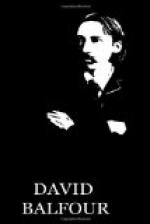“See,” said Stewart, “he couldn’t dare to refuse me access to my client, so he recommends the commanding officer to let me in. Recommends!—the Lord Justice Clerk of Scotland recommends. Is not the purpose of such language plain? They hope the officer may be so dull, or so very much the reverse, as to refuse the recommendation. I would have to make the journey back again betwixt here and Fort William. There would follow a fresh delay till I got fresh authority, and they had disavowed the officer—military man, notoriously ignorant of the law, and that—I ken the cant of it. Then the journey a third time; and there we should be on the immediate heels of the trial before I had received my first instruction. Am I not right to call this a conspiracy?”
“It will bear that colour,” said I.
“And I’ll go on to prove it you outright,” said he. “They have the right to hold James in prison, yet they cannot deny me to visit him. They have no right to hold the witnesses; but am I to get a sight of them, that should be as free as the Lord Justice Clerk himself? See—read: For the rest, refuses to give any orders to keepers of prisons who are not accused as having done anything contrary to the duties of their office. Anything contrary! Sirs! And the Act of seventeen hunner! Mr. Balfour, this makes my heart to burst. The heather is on fire inside my wame.”
“And the plain English of that phrase,” said I, “is that the witnesses are still to lie in prison and you are not to see them?”
“And I am not to see them until Inverary, when the court is set!” cries he, “and then to hear Prestongrange upon the anxious responsibilities of his office and the great facilities afforded the defence! But I’ll begowk them there, Mr. David. I have a plan to waylay the witnesses upon the road, and see if I cannae get a little harle of justice out of the military man notoriously ignorant of the law that shall command the party.”
It was actually so—it was actually on the wayside near Tynedrum, and by the connivance of a soldier officer, that Mr. Stewart first saw the witnesses upon the case.
“There is nothing that would surprise me in this business,” I remarked.
“I’ll surprise you ere I’m done!” cries he. “Do ye see this?”—producing a print still wet from the press. “This is the libel: see, there’s Prestongrange’s name to the list of witnesses, and I find no word of any Balfour. But here is not the question. Who do ye think paid for the printing of this paper?”
“I suppose it would likely be King George,” said I.
“But it happens it was me!” he cried. “Not but it was printed by and for themselves, for the Grants and the Erskines, and yon thief of the black midnight, Symon Fraser. But could I win to get a copy? No! I was to go blindfold to my defence; I was to hear the charges for the first time in court alongst the jury.”




